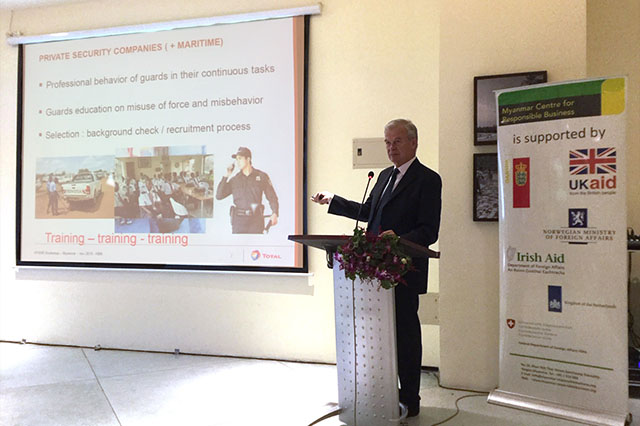Awareness-Raising Workshops Held in Yangon and Naypyidaw on the Voluntary Principles on Security and Human Rights (VPSHR)

Following on from the recommendations of the Scoping Report and the decision of the 18 May Myanmar Steering Committee of the VPSHR, two half-day awareness-raising workshops about the VPSHR and how they could be useful for Myanmar were held in Naypyidaw on 27 November and Yangon on 29 November.
The Naypyidaw workshop was attended by around 40 officials from the Ministry of Natural Resources and Environmental Conservation (Mining, Gems and Pearls Enterprises, DGSE, Dept of Mines and ECD), MOGE, MPE, General Administration Dept (Home Ministry), DICA, as well as U Nyunt Swe of the Myanmar National Human Rights Commission and a number of companies. The Yangon workshop was attended by around 45 local and foreign oil and gas, and mining companies, security providers, NGOs and Embassies.
The two workshops had a similar agenda. The co-chairs of the Steering Committee for the In-country VPSHR Working Group, TOTAL (Romaric Roignan, General Manager) and the UK Embassy (Douglas Barnes, Head of Trade and Investment Section, on behalf of Co-Chair David Hall, Deputy Head of Mission). Douglas Barnes’ speech is available here.
Vicky Bowman, Director, Myanmar Centre for Responsible Business, introduced the VPSHR, highlighting in particular their relevant to Myanmar’s mining sector, including large projects such as Letpadaungtaung copper mine, as well as providing a framework for considering the challenge of artisanal mining in the gold and gemstones sector. Vicky’s presentation explained how the VPSHR was relevant to Myanmar’s regulatory processes for investment, including the Environmental Impact Assessment and Management Plan. She stressed the leading role of companies in implementing the VPSHR, and that its principles could be rolled out successfully in Myanmar without any requirement for the Myanmar government to ‘join’ the initiative.
Jana Naujoks of International Alert Myanmar, one of the NGO members of the Voluntary Principles at global level, explained the role played by NGOs at international, national and project level.
Security experts from TOTAL Woodside, CHEVRON, Shell and PanAust, all global VPSHR members with a Myanmar presence, outlined various aspects of how companies use the VPSHR both in Myanmar and other countries (presentations available in the sidebar).
The participants were electronically polled on their opinion on the most serious security issues facing oil & gas, and mining, in Myanmar; their prior- and post-workshop awareness of the VPSHR; their views on whether it was useful for Myanmar, and priorities for action.
Most serious security issues for the oil and gas sector in Myanmar were identified as by the Naypyidaw participants as Interaction with boats (fishing, refugees) (47%) and Impact on operations of Myanmar security authorities (27%). Yangon participants also identified Interaction with boats (fishing, refugees) as most serious (60%) with Protests and demonstrationscoming second (27%), perhaps reflecting the fact that demonstrations about Rakhine’s natural resources on 27 November were reported after the Naypyidaw workshop and before the Yangon one.
The most serious security issues for the mining sector in Myanmar was identified both in Yangon and Naypyidaw as Protests and demonstrations, (coming top by a significant margin) following by Impact on operations of Myanmar security authorities, and Extortion by armed groups and militia. The Naypyidaw workshop identified Trespass as important. Yangon identified Artisanal mining.
Participants found the VPSHR relevant for Myanmar, with almost identical scores in Yangon and Naypyidaw finding them either relevant for any large investment in Myanmar that has security risks to manage (57%); or relevant for all oil/ gas and mining companies (33%).
Reflecting their role as regulators, Naypyidaw participants identified potential Myanmar VPSHR priorities as Inclusion of VPSHR-related requirements in licences and contracts issued by government (62%), with some votes for Helping private security companies to meet VPSHR requirements; Curriculum and training of public security on VPSHR and Relations between companies and ethnic armed organisations or militia.
The main priority of Yangon participants were Curriculum and training of public security on VPSHR (48%). There was also support, as in Naypyidaw, for Inclusion of VPSHR-related requirements in licences and contracts issued by government (29%). Also identified were Helping private security companies to meet VPSHR requirements (10%); and Reform of licensing and oversight of private security companies (10%).
Both workshops identified the agency most qualified to lead on the VPSHR for government as the Myanmar National Human Rights Commission (28%); with Naypyidaw also highlighting the Ministry of Home Affairs (22%). For Yangon, the other leading choices were MONREC (22%); and the new Ministry of Investment and Foreign Economic Relations (19%).
The Steering Committee of the VPSHR will meet again in January and reflect on next steps for the in-country working group.
The costs of the two workshops were sponsored by Woodside Myanmar.
Read also
- Members of the Myanmar VPSHR Steering Committee meet the Deputy Home Minister
- VPSHR Workshop Hears From Civil Society About Mining Grievances That Can Provoke Company-Community Conflict
- Steering Committee for the Voluntary Principles on Security and Human Rights Myanmar In-Country Working Group meets for the first time
- Discussion of the Voluntary Principles on Security and Human Rights
 English
English မြန်မာ
မြန်မာ မြန်မာ (unicode)
မြန်မာ (unicode)










